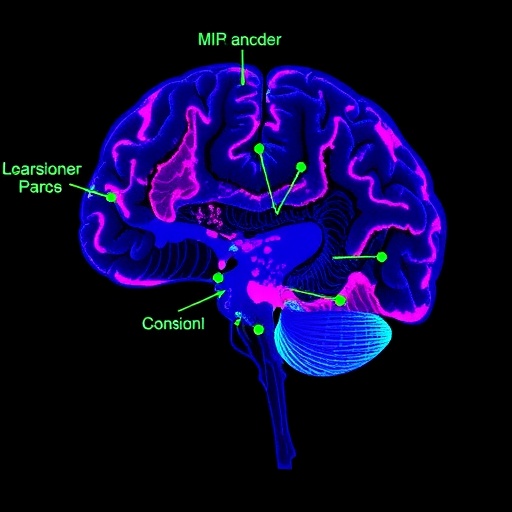In a groundbreaking study published in the Journal of Translational Medicine, researchers led by Zhu and colleagues have uncovered a significant mechanism through which tumor-derived exosomal miR-221-3p plays a crucial role in breast cancer brain metastasis. The findings shed light on the interplay between tumor biology and the cerebral microenvironment, particularly how this tiny RNA fragment can disrupt the integrity of the blood-brain barrier. By modulating glycolytic pathways, exosomal miR-221-3p appears to pave the way for cancer cells to invade the brain, a process that has long intrigued scientists.
The researchers focused their investigation on extracellular vesicles, particularly exosomes, which are nano-sized particles released by cells and containing proteins, lipids, and nucleic acids. These exosomes are known to facilitate communication between cells, especially in a tumor’s local milieu, and can influence the behavior of distant cells. By analyzing exosomes from breast cancer cells, the team identified a notable increase in levels of miR-221-3p, establishing a potential link between tumor activity and the metabolic reprogramming of recipient cells.
One of the key findings of this study was the demonstration that miR-221-3p induces glycolysis in endothelial cells that form the blood-brain barrier. Glycolysis, a metabolic pathway that converts glucose into pyruvate, becomes increasingly prevalent in cancer due to the Warburg effect, where cancer cells preferentially rely on glycolysis for energy production even in the presence of oxygen. This shift signifies a critical adaptation in tumor cells, as it allows them to thrive in the often hypoxic environments associated with aggressive tumors.
The research team delved deeper into the molecular mechanisms involved, identifying the LIFR/GLUT1 signaling pathway as a pivotal target of miR-221-3p. Lifelong insulin-like growth factor receptor (LIFR) has emerged as a fundamental component in various cellular processes, including stem cell maintenance and differentiation. In the context of this study, the upregulation of GLUT1, a key glucose transporter, suggested that breast cancer exosomes exploit this pathway to alter the energy metabolism of endothelial cells, thus compromising the blood-brain barrier’s protective functions.
Moreover, the study presented compelling evidence that elevated levels of miR-221-3p not only facilitated glycolysis but also prompted significant morphological changes in endothelial cells. These alterations seem to be associated with the disruption of tight junctions, which are vital for maintaining vascular integrity. As the endothelial barrier weakens, it creates a favorable environment for breast cancer cells to penetrate the blood-brain barrier, resulting in increased metastatic burden in the brain.
Among the implications of these findings is the potential development of novel therapeutic strategies aimed at intervening in this pathway. By targeting miR-221-3p or its downstream effects, researchers envision a means to bolster the integrity of the blood-brain barrier and prevent the dissemination of breast cancer to cerebral locations. This approach could offer valuable insights into the treatment of brain metastases, a complication that significantly complicates the clinical management of breast cancer patients.
The implications of this research extend beyond strictly breast cancer, as the involvement of exosomal miRNAs in tumor biology may be a universal phenomenon across various cancer types. It opens avenues of investigation to explore how different tumors hijack cellular energy pathways to facilitate metastatic spread and influence the microenvironment.
Additionally, the study encourages further research into exosomal content as potential biomarkers for tumor progression and metastasis. The presence of specific miRNAs in circulating exosomes could be indicative of disease state or prognosis, thereby providing clinicians with vital information necessary for treatment decisions.
Furthermore, the findings emphasize the need for a multidisciplinary approach in cancer research, integrating molecular biology, biochemistry, and clinical insights. Understanding the complexities of tumor exosomes and their influence on distant organs demands extensive collaboration among researchers from diverse fields, fostering innovative strategies to combat cancer’s most challenging aspects.
Overall, Zhu and colleagues’ work represents a promising leap forward in our understanding of cancer metastasis. The intricate web of signaling pathways and metabolic adaptations described provides a rich landscape for future exploration, with the potential to transform how we approach breast cancer treatment and, ultimately, improve patient outcomes.
As research continues to unravel the intricacies of tumor biology and its systemic effects on the body, this article underscores the urgent need to develop targeted therapies that can prevent breast cancer’s fatal spread to the brain. Through innovative approaches and a deeper understanding of the molecular underpinnings of metastasis, we edge closer to more effective treatments for one of the most formidable challenges in oncology today.
In conclusion, findings like those presented in this study mark a critical step toward unraveling the mystery of breast cancer brain metastasis and hold significant promise for developing new therapeutic interventions. The integration of novel insights into the metabolic reprogramming of tumor cells has the potential to redefine our strategies in cancer management, offering hope to patients facing the daunting prospect of metastatic disease.
Subject of Research: Breast cancer brain metastasis and the role of exosomal miR-221-3p in glycolysis.
Article Title: Tumor exosomal miR-221-3p induces glycolysis through the LIFR/GLUT1 pathway to destroy the cerebral vascular endothelial cell barrier and promote breast cancer brain metastasis.
Article References:
Zhu, K., Yao, H., Hei, J. et al. Tumor exosomal miR-221-3p induces glycolysis through the LIFR/GLUT1 pathway to destroy the cerebral vascular endothelial cell barrier and promote breast cancer brain metastasis.
J Transl Med 23, 1333 (2025). https://doi.org/10.1186/s12967-025-07372-8
Image Credits: AI Generated
DOI: https://doi.org/10.1186/s12967-025-07372-8
Keywords: exosomal miR-221-3p, brain metastasis, glycolysis, LIFR/GLUT1 pathway, breast cancer.




